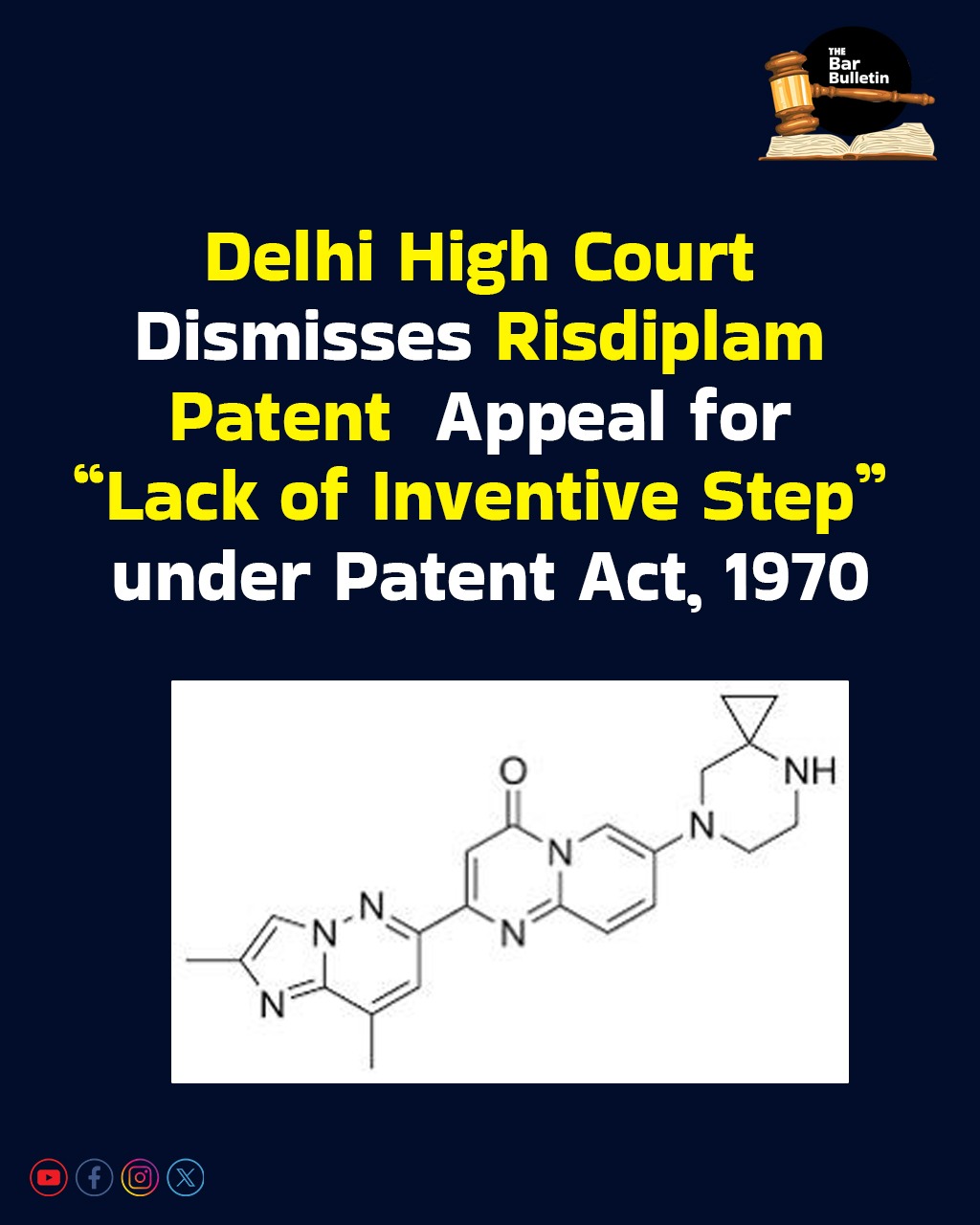The Delhi High Court dismissed an appeal for patent infringement concerning the pharmaceutical compound Risdiplam, developed for the treatment of spinal muscular atrophy (SMA). Justices C. Hari Shankar and Ajay Digpaul stated that although the patent met the novelty requirement, it lacked an inventive step under Section 64(1)(f) of the Patents Act, 1970.
The dispute arose out when the appellants, holders of the Risdipam patent valid until 11.05.35 claimed that the respondent had manufactured, marketed, and sold Risdiplam without authorization. They argued that their patent for Risdiplam was an independent and valid invention, distinct from the genus patents. They submitted that while the compound might be covered under the broad Markush formula of the earlier patents, it was not disclosed or enabled in them and emphasized the legal distinction between “coverage” and “disclosure”. The appellants pointed out that the genus patent in question contained millions of potential compounds, and the mere possibility of Risdiplam being one among them did not mean that it was anticipated.They contended that the substitution in Risdiplam’s structure led to superior pharmacological properties and therapeutic efficacy, establishing inventive step and novelty deserving of separate patent protection.The respondent argued that the suit patent lacked novelty and inventive step, as Risdiplam was already anticipated by prior art and not new, particularly Compound 809 from WO‘916 and US‘955.They contended that Risdiplam was merely a species within the broader genus patent, differing only by the substitution of a CH group with a nitrogen atom, an obvious modification that any skilled chemist would make in pursuit of improved activity. The respondents relied on AstraZeneca AB v. Intas Pharmaceuticals Ltd. 2021 SLP (C) 15650-15658 and stated that since the same inventors held both genus and species patents, the test of obviousness must be applied from the perspective of a “person in the know.” The species patent thus amounted to an attempt at evergreening and was unenforceable under Section 64(1)(f) of the Patents Act, 1970, which provides for revocation of a patent where the invention lacks an inventive step.
The Court noted that a compound is “covered” by a prior patent if it falls within a generic formula, but it is “disclosed” only if the prior patent explicitly reveals that compound. Since the genus patents WO‘916 and US‘955 neither identified Risdiplam nor provided specific guidance for its synthesis or therapeutic use, the Court noted that Risdiplam was neither disclosed nor anticipated.However, on the issue of inventive step under Section 64(1)(f) of the Act the Court upheld the finding that the suit patent lacked inventiveness and observed that Compound 809 from the genus patents and Risdiplam were structurally very similar, differing only by the substitution of a CH group with a nitrogen atom. It stated that such a modification would have been an obvious step for any skilled chemist seeking to improve biological or chemical stability.
The Court noted that the appellants failed to show that this substitution produced any unexpected or superior properties, and the absence of surprising technical advantages rendered the invention obvious. Accordingly, the Court dismissed the appeal as the novelty challenge under Section 64(1)(e) could not be sustained and the patent failed the test of inventive step under Section 64(1)(f) of the Act.
For the Appellants : Advs.- Mr. Sandeep Sethi, Sr. Adv. with Mr. Pravin Anand, Ms. Archana Shanker, Mr. Shrawan Chopra, Ms. Prachi Agarwal, Mr. Devinder Rawat, Mr. Achyut Tewari, Ms. Elisha Sinha, Ms. Krisha Baweja, Mr. Aayush Maheshwari, Mr. N. Mahabir, Ms. Shreya Sethi and Mr. Sumer Seth
For the Respondent : Advs- Mr. J. Sai Deepak, Sr. Adv. with Mr. Afzal B. Khan, Mr. Samik Mukherjee, Mr. Dominic Alvares, Ms. Amrita Majumdar, Mr. Avinash K. Sharma and Mr. Sharad Besoya, Advs. Mr. Sethi Grover, Sr. Adv. with Mr. Varun Jain and Mr. Rohin Bhatt, Advs. for Intervener Ms. Rajeshwari H., Ms. Purva Mittal and Mr. Tahir A. J., Advs. for Intervener

